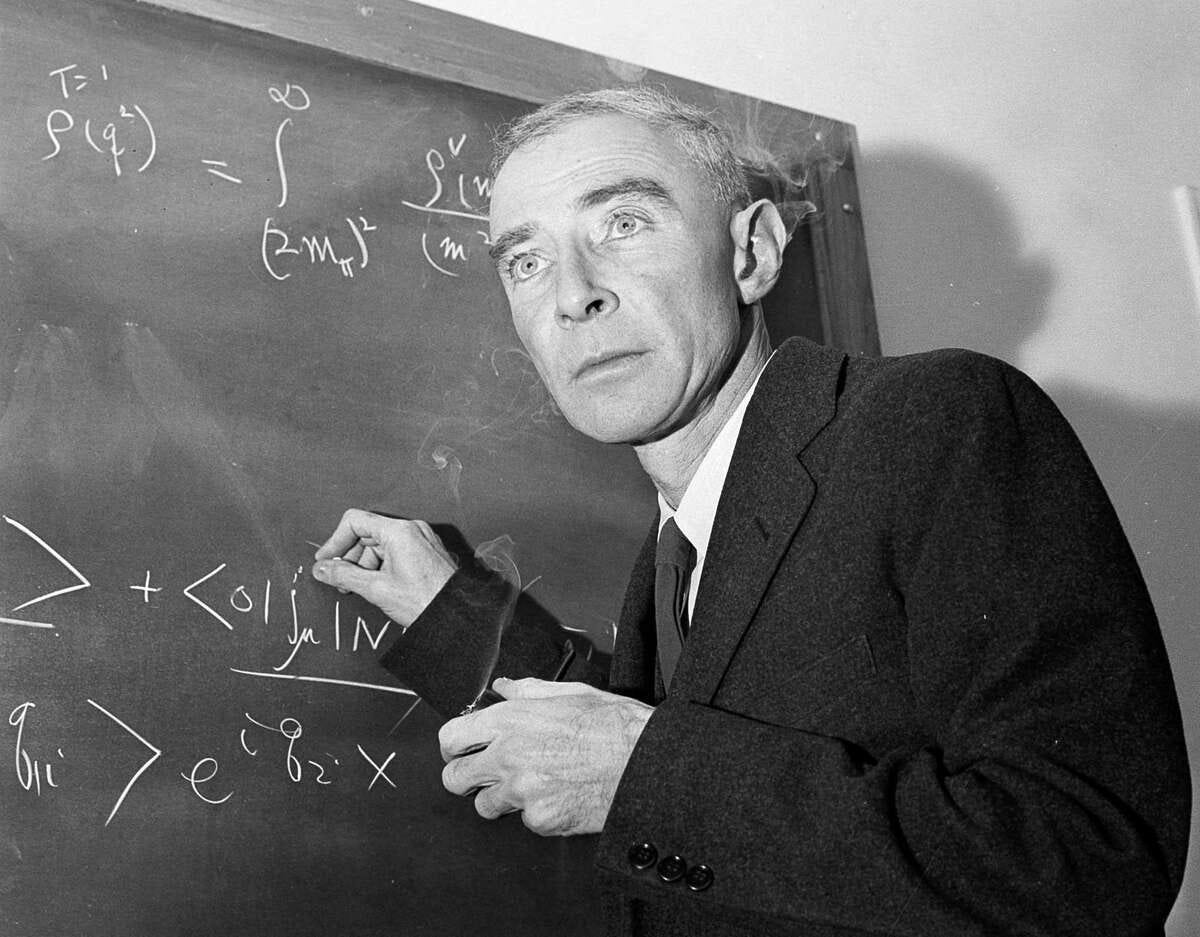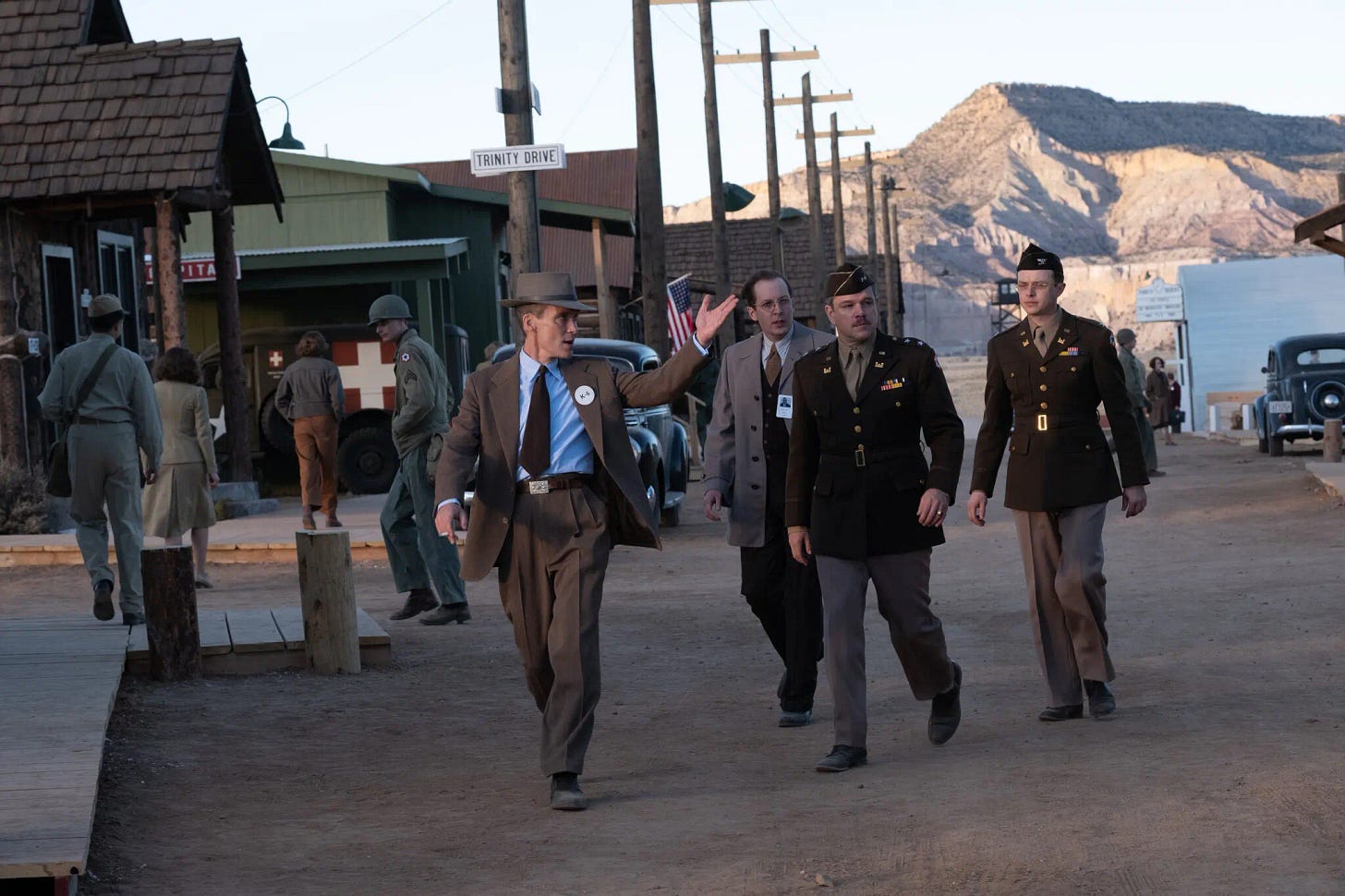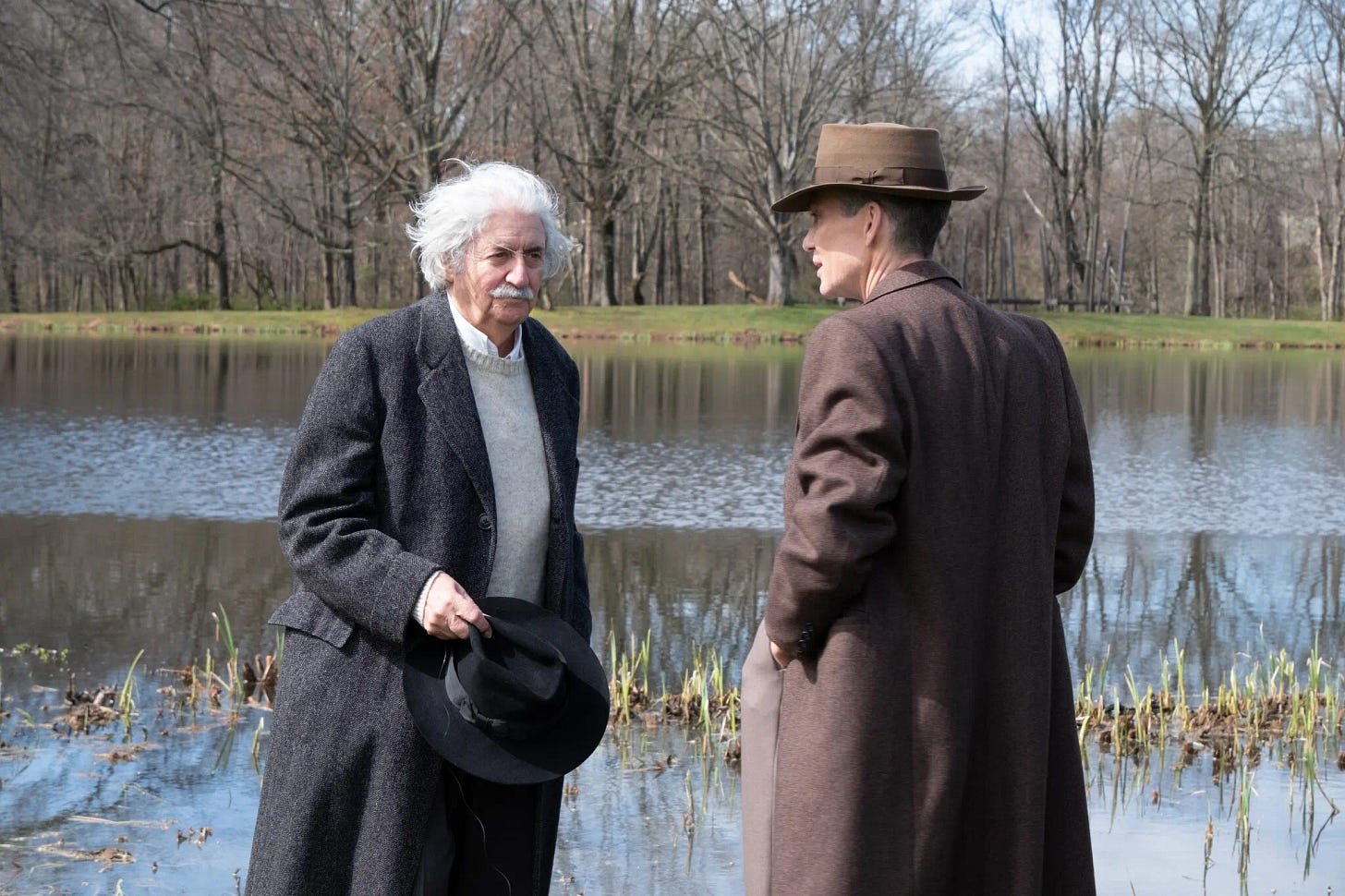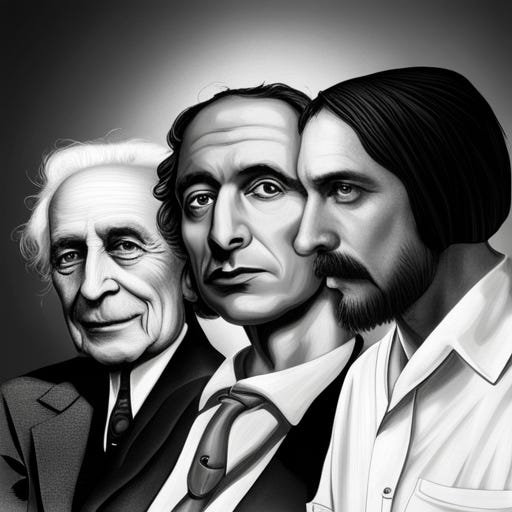Oppenheimer: the Man, the Mystique and the Movie.
Explore the intricate relationship between science, philosophy, and the pursuit of a more peaceful world in the highly anticipated biopic "Oppenheimer," directed by Christopher Nolan. Releases today.
J. Robert Oppenheimer, the brilliant American physicist known as the father of the atom bomb, led a life of extraordinary complexity and intellectual depth. Born to German Jewish immigrants in New York City in 1904, his groundbreaking scientific achievements, along with his profound engagement with the philosophical teachings of the Bhagavad Gita, shaped his unique worldview. Oppenheimer's pivotal role in the "Manhattan Project," where he led the team that developed the first atomic bomb during the crucial years of the Second World War, forever altered the course of history.
Dr. J. Robert Oppenheimer is shown at his study in Princeton University's Institute for Advanced Study, Princeton, N.J., Dec. 15, 1957.
The immense power unleashed by this invention weighed heavily on Oppenheimer's conscience. The devastating bombings of Hiroshima and Nagasaki deeply affected him, leading him to grapple with the ethical implications and moral dilemmas surrounding his creation.
Bhagavad Gita’s influence: During this introspective period, Oppenheimer found solace and guidance in the Bhagavad Gita, the ancient sacred Hindu text that delves into profound insights regarding the nature of life, its meaning, and the moral duties of individuals. The teachings of the Bhagavad Gita deeply resonated with him, particularly Lord Krishna's discourse on the moral (‘dharmic’) responsibility of individuals. Its verses accentuated the interconnectedness of all beings and the impermanence and transience of worldly attachments, leaving a lasting impact on Oppenheimer's philosophy of life. It also provided him with a moral compass and a framework to reconcile the immense power of science with the ethical considerations that accompany it.
Unifying science and spirituality: Oppenheimer firmly believed that science and spirituality were not mutually exclusive realms but rather intertwined aspects of human existence. For him, the pursuit of knowledge and the exploration of the mysteries of the universe were not merely scientific endeavors, but also spiritual journeys. The Bhagavad Gita, with its profound philosophical depth and spiritual teachings, served as a guiding beacon in his quest to understand the moral implications of his scientific pursuits. Through the wisdom of this sacred text, Oppenheimer found illumination in navigating the ethical considerations that accompanied his groundbreaking scientific achievements, enriching his unique worldview that harmoniously integrated science and spirituality.
Murphy as Oppenheimer. “The film certainly tries to embrace the iconic nature of who the man was but also understand that it’s self creative and self-conscious,” Nolan said. Credit...Universal Pictures/ NYT.
Advocacy for World Peace: Throughout his life, Oppenheimer sought to promote international cooperation and the peaceful use of atomic energy. He became a vocal advocate for arms control, recognizing the destructive potential of nuclear weapons and the urgent need to prevent their proliferation. Oppenheimer played a significant role in the establishment of the United States Atomic Energy Commission, where he continued to advocate for the responsible and peaceful harnessing of atomic energy.
Hiroshima and Nagasaki: In the aftermath of World War II, the bombings of Hiroshima and Nagasaki ended the war against Japan in 1945, with Oppenheimer hailed as a hero. However, only a few years later, in 1954, his security clearance was revoked in an infamous hearing of advisers to the Atomic Energy Commission. They declared him a security threat based on his alleged leftist ties at the University of California, Berkeley. Additionally, Oppenheimer's opposition to building an even bigger bomb, the "Super" or hydrogen bomb, espoused by his colleague Edward Teller, contributed to the decision.
Truman called Oppenheimer a “crybaby”. The physicist “was very, very strategic in his thinking and still got crushed and still came across as naïve,” Nolan said. Credit...Universal Pictures/ NYT.
Cold War Ensues—Left Out in the Cold: This revocation marked the end of Oppenheimer's career in government circles and his ability to influence the future of atomic energy in the Cold War. As a result, he became a kind of martyr to the scientific community. Many physicists, including Albert Einstein, were disappointed that the United States had dropped the bomb without warning on an enemy that was already defeated. Oppenheimer, on the other hand, had hoped that the advent of the bomb would make war unthinkable and lead to international controls on such weapons. However, with the Soviet Union also possessing nuclear capabilities, those dreams were challenged by hard-liners in the government, including President Harry S. Truman, who famously referred to Oppenheimer as a "crybaby."
From left, Cillian Murphy, Olli Haaskivi, Matt Damon and Dane DeHaan in a scene set at Los Alamos. Credit...Melinda Sue Gordon/Universal Pictures/ NYT.
Movie Premieres Today: In bringing "Oppenheimer" to life, Christopher Nolan assembled a star-studded cast to portray the pivotal figures in the physicist's journey. With Cillian Murphy masterfully embodying Oppenheimer's cerebral and tortured character, Matt Damon as the authoritative Gen. Leslie Groves, and Robert Downey Jr. as the formidable Adm. Lewis Strauss, the film promises a captivating exploration of the intricate relationships that shaped history.
Nolan on the set with Murphy. The actors brought their own research to the shoot. Credit...Melinda Sue Gordon/Universal Pictures/NYT.
The New York Times interview: Nolan's disclosed in the interview that dedication to authenticity led him to forego computer-generated imagery for the crucial Trinity Test scene, opting instead for real-world analog effects. This decision will immerse the audiences in the tension and uncertainty faced by those at the forefront of the atomic age. As a filmmaker known for thought-provoking narratives, Nolan faced the challenge of distilling Oppenheimer's complex life into a cohesive and thematically resonant story. Through meticulous research and attention to historical accuracy, he sought to offer a deep and immersive cinematic experience that delves into the inner struggles and ethical dilemmas of the man behind the bomb1.
From the Twitter handle of : “Nolan is wild. On location is the gold standard. Nothing beats full immersion, especially when you need your truck slapped by a field full of corn lol.”
What we can expect: As "Oppenheimer" graces the silver screen today, Christopher Nolan's cinematic portrayal of J. Robert Oppenheimer's life promises to be a mesmerizing exploration of a visionary scientist who forever altered history's trajectory. The biopic is expected to delve not only into Oppenheimer's scientific brilliance but also his profound introspection and contemplation of spiritual and philosophical concepts, notably inspired by the Bhagavad Gita2.
Tom Conti as Einstein opposite Murphy. In the film, Oppenheimer consults the eminent physicist, but in reality he consulted another colleague.Credit...Melinda Sue Gordon/Universal Pictures
Realistic portrayal: Oppenheimer's unwavering dedication to the pursuit of knowledge and the betterment of humanity will serve as a compelling reminder of the intricate relationship between science, philosophy, and spirituality in shaping a more peaceful world. As viewers immerse themselves in the complexities of Oppenheimer's journey, they will be prompted to ponder the moral complexities of scientific advancements and the profound responsibilities that come with wielding immense power.
Lesson beyond the movie: Through Nolan's masterful storytelling, "Oppenheimer" promises to offer a thought-provoking experience, inviting viewers to reflect on the ethical implications of scientific breakthroughs and the profound impact individuals can have on the course of history. It is a cinematic voyage that captures the essence of Oppenheimer's life while becoming a poignant exploration of the interplay between science, philosophy, and the human spirit in our quest for understanding and a more harmonious world3.
https://www.nytimes.com/2023/07/20/movies/christopher-nolan-oppenheimer.html?auth=login-google
“The New York Times” 20th July edition, published on the day of the release of the movie “Oppenheimer”.
Director Christopher Nolan goes into the challenges and intricacies— both technical and research-oriented— behind the making of the movie.
Tesla, Oppenheimer, Osho and Einstein: Understanding Life and the Universe
Introduction: Throughout the annals of history, there have been exceptional individuals whose ideas and insights transcend time, inspiring us to contemplate the profound mysteries of life and the universe. Nikola Tesla, Acharya Rajneesh (Osho), Albert Einstein, and J. Robert Oppenheimer are among these visionary thinkers who have left an indelible mark …
The Secret Diary of Jean Tatlock: Oppenheimer's First and Last Love
In the captivating world of academia, I, Jean Tatlock, found myself drawn to the luminous presence of J. Robert Oppenheimer, a brilliant physicist whose very being ignited a fire within my soul. As fate would have it, we met at one of Mary Ellen Washburn














